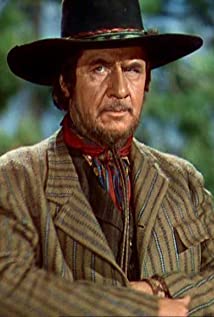George Bancroft
George Bancroft was raised in Philadelphia and attended high school at Tomes Institute (Philadelphia). He won an impressive appointment to the United States Naval Academy at Annapolis and graduated as a commissioned officer. He served in the Navy for the prescribed period of required service but no more. He decided to turn to show business, first as a theater manager. He worked in the old and fading minstrel show variety format into the 1920s but then decided to try his hand at acting. By 1923, he was good enough for Broadway and spent about a year there doing two plays. But he was already good enough for some early camera work for by 1921, so he had made his first appearance in the silent movie medium. Being a big man with dark features, he was a natural for heavies. And it seemed that early Westerns were an easy fit as well after his first four films. Through 1924 and into 1925, he did four, culminating with pay dirt in his appealing performance as rogue Jack Slade in the James Cruze Western The Pony Express (1925). With him was another up-and-coming character actor, Wallace Beery. Bancroft's acting made Paramount Pictures take a look at him as star material. His roles as tough guy took on more flesh into the later 1920s, especially in association with director Josef von Sternberg and his well-honed gangster films that started with Underworld (1927). Their work culminated with Sternberg's Thunderbolt (1929) for which Bancroft received an Oscar nomination. He was tops at the box office.
Bancroft's various on-screen personas as bigger-than-life strong man was not far from his off-screen character as Hollywood notability got to him. It was recalled that he became more difficult to deal with as his ego grew. At one point, he refused to obey a director's order that he fall down after being shot by the villain. Bancroft declared, "One bullet can't kill Bancroft!" Although he stayed busy through the 1930s, he was older and stouter -- the stuff of featured characters. And Bancroft was also getting a lot of competition from younger character actors. In the early '30s, his roles continued to typecast him as lead heavies, but increasingly, he was cast as second tier -- if with more variety -- in later roles. He was paper editor MacWade in Mr. Deeds Goes to Town (1936); a doctor in A Doctor's Diary (1937); a few sea captains along the way; and most memorably Marshal Curly Wilcox in the John Ford Western (his first with sound) Stagecoach (1939). Here he is particularly engaging tough lawman but with a big heart. Into the 1940s, he only did a handful of films. But he again had a rogue's spotlight with another name director -- Cecil B. DeMille -- in one of his always epic yarns. This time it was a Texas Ranger chasing a murderer over the Canadian border in North West Mounted Police (1940) with a stellar cast including Gary Cooper, everybody's favorite blond Madeleine Carroll, and Paulette Goddard as fleeing criminal, Jacques Corbeau's (Bancroft) daughter. By 1942, Bancroft had decided to move on, retiring with the intention of becoming a Southern California rancher. He quietly assumed this new role for a long run of 14 years before his passing.

